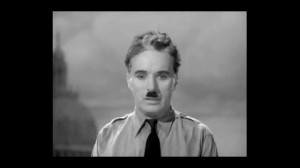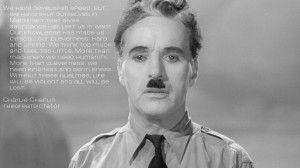Paris Journal (July-August 1974)
From the July-August 1974 Film Comment. Portions of this column (one of my best, and crankiest) have appeared elsewhere, including on this site, but this is the full version. -– J.R.

February 16: Chaplin’s THE GREAT DICTATOR. As a friend has pointed out, Chaplin doesn’t really belong to the history of cinema; he belongs to history. What for another artist might only come across as misjudgment, naïveté or bad taste often registers in a Chaplin film as personal/ historical testimony of the most candid and searing sort. Thus the total inadequacy of his impassioned speech at the end of THE GREAT DICTATOR — as art, as thought, as action, as anything — becomes the key experience that the film has to offer, revealing the limitations of human utterance in face of the unspeakable. For roughly two hours, ChapIin has been trying to defeat Hitler by using every trick that he knows; finally exhausting his capacities for comedy and ridicule, and realizing that neither is enough, he turns to us in his own person and tries even harder, making a direct plea for hope. But while he effectively annihilates the Tramp before our eyes, he simultaneously recreates him in a much more profound way, exposing the brutal fact of his own helplessness. Read more

